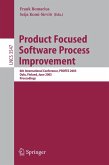This book presents a concise description of knowledge management in the software architecture discipline. It explains the importance of sound knowledge management practices for improving software architecture processes and products, and makes clear the role of knowledge management in software architecture and software development processes. It presents many approaches that are in use in software companies today, approaches that have been used in other domains, and approaches under development in academia. After an initial introduction by the editors, the contributions are grouped in three parts on "Architecture Knowledge Management", "Strategies and Approaches for Managing Architectural Knowledge", and "Tools and Techniques for Managing Architectural Knowledge".
The presentation aims at information technology and software engineering professionals, in particular software architects and software architecture researchers. For the industrial audience, the book gives a broad and concise understanding of the importance of knowledge management for improving software architecture process and building capabilities in designing and evaluating better architectures for their mission- and business-critical systems. For researchers, the book will help to understand the applications of various knowledge management approaches in an industrial setting and to identify research challenges and opportunities.
Dieser Download kann aus rechtlichen Gründen nur mit Rechnungsadresse in A, B, BG, CY, CZ, D, DK, EW, E, FIN, F, GR, HR, H, IRL, I, LT, L, LR, M, NL, PL, P, R, S, SLO, SK ausgeliefert werden.









